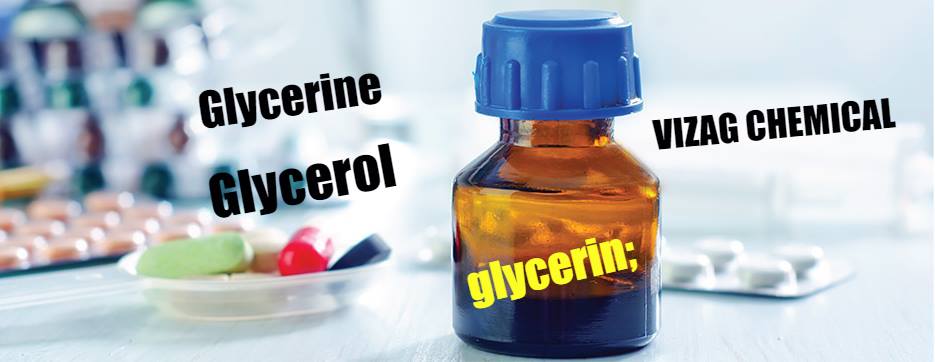Best glycerine price in visakhapatnam India
Vizag Chemical is a indian based supplier & distributor of Vegetable Glycerine in visakhapatnam . We can supply Glycerine for both food and technical uses.
Glycerol also called glycerine or glycerin; see spelling differences) is a simple polyol compound. It is a colorless, odorless, viscous liquid that is sweet-tasting and non-toxic. The glycerol backbone is found in all lipids known as triglycerides. It is widely used in the food industry as a sweetener and humectant and in pharmaceutical formulations. Glycerol has three hydroxyl groups that are responsible for its solubility in water and its hygroscopic nature.
Applications
Food industry
In food and beverages, glycerol serves as a humectant, solvent, and sweetener, and may help preserve foods. It is also used as filler in commercially prepared low-fat foods (e.g., cookies), and as a thickening agent in liqueurs. Glycerol and water are used to preserve certain types of plant leaves. As a sugar substitute, it has approximately 27 kilocalories per teaspoon (sugar has 20) and is 60% as sweet as sucrose. It does not feed the bacteria that form plaques and cause dental cavities.[citation needed] As a food additive, glycerol is labeled as E number E422. It is added to icing (frosting) to prevent it from setting too hard.
As used in foods, glycerol is categorized by the Academy of Nutrition and Dietetics as a carbohydrate. The U.S. Food and Drug Administration (FDA) carbohydrate designation includes all caloric macronutrients excluding protein and fat. Glycerol has a caloric density similar to table sugar, but a lower glycemic index and different metabolic pathway within the body, so some dietary advocate accept glycerol as a sweetener compatible with low-carbohydrate diets.
It is also recommended as an additive when using polyol sweeteners such as erythritol and xylitol which have a cooling effect, due to its heating effect in the mouth, if the cooling effect is not wanted.
Chemical intermediate
Glycerol is used to produce nitroglycerin, which is an essential ingredient of various explosives such as dynamite, gelignite, and propellants like cordite. Reliance on soap-making to supply co-product glycerol made it difficult to increase production to meet wartime demand. Hence, synthetic glycerol processes were national defense priorities in the days leading up to World War II. Nitroglycerin, also known as glyceryl trinitrate (GTN) is commonly used to relieve angina pectoris, taken in the form of sub-lingual tablets, or as an aerosol spray.
Research on uses
Research has been conducted to try to make value-added products from glycerol obtained from biodiesel production. Examples (aside from combustion of waster glycerol):
Hydrogen gas production
Glycerine acetate is a potential fuel additive.
Conversion to propylene glycol
Conversion to acrolein
Conversion to ethanol
Conversion to epichlorohydrin, a raw material for epoxy resins


Leave a comment